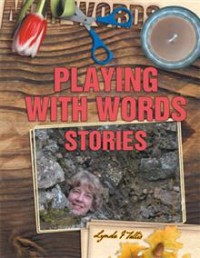Title: Playing With Words: Stories
Author: Lynda Tallis
Publisher: XlibrisUK
ISBN: 978-1-4836-0404-6
Pages: 50
Genre: Fiction
Reviewed by: J.W. Bankston
Buy on Amazon
Pacific Book Review
Short story collections and anthologies often benefit from a unifying theme. Perhaps the stories revolve around the author’s childhood or an anthology is focused on a particular region. In Lynda Tallis’ volume of very short stories, twin themes of an abiding love for nature and neo-Druidism emerge. These two connected philosophies strengthen “Playing With Words.”
Tracing back centuries before the birth of Christ, the practices and lives of the original Druids remain a mystery. There is considerable evidence that this pagan religion practiced human sacrifice. Many Druids were evidently well-educated and well-placed in society; there are suggestions that women held important roles. When author Tallis connects the stories in “Playing With Words” to “…observations of life and my spiritual path as Druid,” she is presumably referencing the more recent revival of Druidism in the 18th and 19th centuries. With its belief in the harmony and worship of nature, Tallis’ neo-Druidism allows her to employ both realism and fantasy within an overarching theme. Thus at the book’s midpoint, a farmer’s plan to dispatch with a burdensome tree leads to his own demise: “Every blow you struck to the tree,” he is warned, “was to yourself as this is the tree of life.” Incidentally, the story formed the basis for a short film by Celestial Elf.
Science fiction makes an appearance with a series of linked stories centered on the quest for new worlds in the aftermath of a home planet’s destruction. Fantasy elements and the feeling of fairytale inform stories about the Snow Queen’s return.
Not every story is so clearly connected to nature or Druidism. Some are amusing anecdotes, like “Told You So.” In this story, a woman plans cruises and shopping trips for her best friend who just knows this will be the week she wins the lottery. In the volume’s opener, the protagonist offers a first person perspective of Alzheimer’s disease. Here, and in many other selections, Tallis’ displays an empathy that has more to do with her own admission that, “I started writing to help with my dyslexia.”
Although some stories would benefit from a bit of plot and character development as few are over two pages in their present form. The book itself is beautifully designed. My e-book version featured illustrations and “paper” with authentic-looking texture. There’s something odd about reading such a naturalistic book on an electronic device. Then again, presumably no trees were harmed in the production of my version of “Playing With Words.” Regardless of whether readers chose the electronic or soft cover versions, they are sure to be amused and perhaps enlightened by the stories in Tallis’ book. After a bit of reading, perhaps a walk in the woods, or the closest park will be in order.



Follow Us